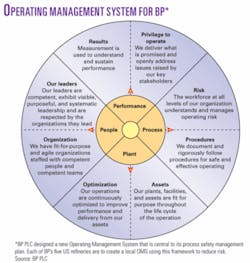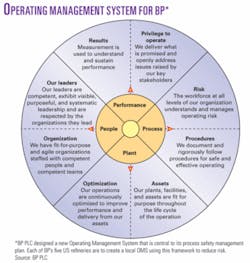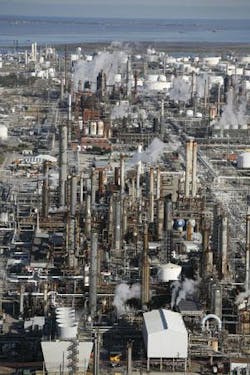SPECIAL REPORT: Refiners apply safety lessons from BP Texas City explosion
Refiners are applying safety lessons while BP PLC responds to recommendations from the US Chemical Safety and Hazard Investigation Board (CSB) following the deadly Mar. 23, 2005, explosion at BP America Inc.’s Texas City, Tex., refinery.
The CSB directed its Texas City incident recommendations toward BP, the American Petroleum Institute, the US Department of Occupational Safety & Health Administration (OSHA), and others.
This story examines how BP, API, and OSHA are addressing CSB’s key recommendations following the explosion that killed 15 people and injured 170 others at the 446,500 b/cd refinery.
BP has increased its health, safety, and environment staff; expanded safety and operations training; and spent more than $1 billion over 5 years to rebuild key gasoline production units, update control systems, and implement other recommendations.
CSB issued a series of recommendations during a 2-year period. A final report cited noncompliance with procedures, inadequate equipment maintenance, and personnel mistakes as contributing factors.
One early, urgent CSB recommendation was for BP to establish an independent panel to evaluate the corporate safety culture at the company’s five US refineries.
The panel, chaired by former US Sec. of State James A. Baker III, made extensive recommendations for improved safety leadership at BP’s corporate level. The Baker Panel report was completed in January 2007.
Industry reacts
Many oil companies launched voluntary, internal process safety management (PSM) audits based on the Baker Panel report and also CSB’s overall recommendations. Some have even conducted process safety culture evaluations. The Baker Panel concluded BP emphasized personal safety to the detriment of process safety (OGJ, Jan. 28, 2008, p. 60).
John S. Bresland, CSB chairman and chief executive officer, said, “The Baker Panel report is one of the more significant reports written on the refining industry in the last 10-15 years. Much of the refining industry is taking to heart the recommendations.”
He added that oil companies and chemical companies are studying the reports.
Companies abroad have requested copies of a CSB safety video entitled “Anatomy of a Disaster” about the BP Texas City explosion.
Steve Arendt, a vice-president with ABS Group Consulting, was contracted by the Baker Panel to lead the independent assessment of the five US BP refineries on behalf of the panel. Since then, he has given about 100 presentations to various industries, including talks to more than 40 oil companies.
“The effect of the Baker report and the CSB investigation was the equivalent of an extension of Sarbanes-Oxley to process safety,” Arendt said. The Sarbanes-Oxley Act of 2002 requires top executives to certify corporate financial statements. It was enacted as part of the response to questionable accounting practices at companies, including Enron Corp.
“Process safety is now on the radar screen of boards and chief executive officers,” Arendt said. “It became much more of a board-level topic because of the Baker Panel’s conclusions about the organizational culture issues that existed in BP at the time of the accident.”
Companies have used numerous approaches to apply lessons from the reports of the CSB and the Baker Panel, said Arendt, who encourages senior managers of oil companies to connect the lessons from both technical evaluations and culture evaluations.
“If you don’t address organizational culture, then all the problems uncovered from a technical standpoint are likely to return,” Arendt said.
Refining is a heavily regulated industry with oversight from OSHA, the US Environmental Protection Agency, the US Department of Transportation, and other federal agencies. API has its own standards and practices program.
API updates standards
CSB asked API to review several of its refining standards. API has about 500 published standards and practices, including more than 100 recommended practices pertaining to PSM.
David Miller, director of API’s standards program, said API constantly seeks to improve its standards. In any given year, API normally updates 60-70 standards. API standards are not binding, but they often help regulators determine safe operating practices.
“The CSB recommendations have forced us to step back and refocus on certain issues and look at some additional information,” Miller said. “If the lessons learned can be woven into the standards to make them more effective, we certainly want to do that.”
In its BP Texas City investigation, CSB concluded trailers were placed too close to a 24,300 b/cd isomerization unit. All 15 fatalities occurred in and around trailers that were as close as 121 ft to a blowdown drum, which released flammable liquid hydrocarbons. About 40 trailers were damaged or destroyed.
Upon a CSB recommendation, API revised its standard on the siting of portable buildings at process plants to establish minimum safe distances from hazardous areas. The CSB lists the status of that recommendation as closed and acceptable.
Ron Chittim, API senior refining associate, said a large API task force continues reviewing a siting standard for permanent buildings, such as control rooms, at process plants.
API has finished revising its standard for pressure relieving and depressurizing systems. As of late August, CSB was reviewing that standard. Manuel Gomez, director of the CSB Office of Recommendations, expects that review to be finished within 2-3 months.
CSB found that the BP Texas City blowdown drum lacked functioning equipment that would have warned that it was being overfilled. Chittim said API added some cautionary wording to provide guidance to users of blowdown drums about risk and hazard analysis.
“We do believe there are certain circumstances when blowdown drums are properly designed and operated that they are a reliable pressure-relieving option,” Chittim said.
CSB’s Gomez said, “BP has basically eliminated the use of the blowdown drums. We hope the industry would generally be moving in the same direction.”
In addition, API is working with the United Steelworkers Union to develop an American National Standards Institute (ANSI) standard on performance indicators on process safety and a new ANSI standard on worker fatigue prevention.
ANSI accredits API’s standards. In July, representatives from API, ANSI, and the industry met in Houston for an organizational meeting regarding development of the CSB-requested standards. CSB sent observers to that meeting, said Gomez, adding that more meetings are scheduled for September.
OSHA audits refineries
CSB said OSHA conducted only one planned PSM inspection at the BP Texas City refinery in 1998 despite numerous fatal accidents during 1985 to 2005. Other unplanned inspections, typically narrower in scope, did occur.
OSHA fined BP more than $21 million on Sept. 22, 2005, for what CSB called “more than 300 egregious and willful violations” at the plant.
CSB recommended that OSHA implement a national emphasis program (NEP) involving detailed refinery inspections. The refining NEP was launched in June 2007. OSHA’s NEP audits are scheduled to be finished by June 2009, but some consultants believe that deadline probably will be extended in some regions with many refineries.
Mike Marshall, PSM coordinator in OSHA’s directorate of enforcement programs, said Aug. 28 that OSHA inspectors completed audits at 37 of 81 refineries subject to the NEP audits.
“Of those 37 refineries, we’ve issued citations in 26,” Marshall said. “We’re finding more deficiencies than we expected.”
NEP involves inspections of contractors as well as refiners. Counting both refiners and contractors, OSHA has completed 86 NEP inspections. As of June 11, a total of 344 PSM citations were issued, including proposed penalties of $2.15 million.
Citations issued
The most frequent NEP refining citations involve mechanical integrity, process hazards analysis, operating procedures, and process safety information, OSHA told participants of the Global Congress on Process Safety.
The US has 151 refineries, but many are exempt from NEP because they are in state-plan states where states enforce the OSHA standards. Other refineries are exempt because they are in the Voluntary Protection Participation (VPP) program.
Bresland told OGJ that he hopes OSHA inspectors entering VPP sites for inspections outside NEP do “a detailed evaluation of compliance with PSM issues.” Gomez agreed, saying VPP sites are selected in part because of low injury and illness rates.
“That is precisely the indicator that we found troubling at the Texas City site because it’s an indicator that did not in any way predict all of the shortcomings of process safety,” Gomez said. “You can have low injury and illness rates reported, but that is not predictive of very high risk in terms of process safety and very serious problems.”
From the time an OSHA inspection team arrives at a refinery, it has 6 months to complete its inspection and issue any citations. Arendt said he knew of at least two inspections that took the full 6 months.
The NEP directive includes a reference section including industry standards, recommended practices, and guidance from API and the American Institute of Chemical Engineers’ Center for Chemical Process Safety (CCPS).
CCPS has published what Arendt calls “next-generation” PSM reference guidelines entitled Guidelines for Risk Based Process Safety.
ABS Consulting Senior Process Safety consultant Jim Thompson urges petrochemical plants to maintain high-level PSM programs because OSHA has indicated that a chemicals NEP will be modeled after the refinery NEP.
The chemical NEP is expected to involve more OSHA inspectors and take longer than the refining NEP because some 28,000 chemical plants are under OSHA jurisdiction.
CSB also recommended that OSHA amend its PSM standard to require that “a management of change review” be conducted for organizational changes that could impact process safety. These include mergers, acquisitions, reorganizations, and policy changes, such as budget-cutting measures.
Bresland said that recommendation remains open because CSB and OSHA still are having discussions about it.
CCPS also recently published new industry guidelines on management of change, addressing some aspects of organizational change.
Independent expert appointed
BP appointed L. Duane Wilson as an independent expert to make periodic reports to the BP board. Wilson briefs the board’s safety, ethics, and environment assurance committee.
A CSB recommendation calls for BP to appoint an additional nonexecutive member to its board. That board member is to have professional experience and expertise in refinery operation and process safety.
Bresland said CSB lists the status of that recommendation as remaining open. “BP is saying they are complying with at least the intent of the recommendation…by hiring a gentleman to evaluate the operation of BP’s US refineries for a period of 5 years.”
But CSB had asked BP to appoint someone to the board, Bresland notes, adding that more detailed discussions are pending with BP and also with UK authorities on this matter.
“One issue here obviously is that BP is a company that is headquartered in the UK, and the CSB is headquartered in Washington, DC,” Bresland said. “We need to make sure that what we recommend falls in with the goals and wishes of the appropriate UK authorities, mainly the health and safety executive in the UK.”
In May, Wilson presented his first report. He said BP appears to be making substantial progress in changing culture and addressing process safety improvements.
“BP has stated its intent to become less bureaucratic, reduce complexity, and simplify activities,” Wilson said. “A significant amount of work remains to be done on the process safety journey. Successful completion of the task will require the continued support and involvement of the board, executive management, and refinery leadership along with a sustained effort over an extended period of time.”
He said all five US BP refineries have made progress addressing recommendations related to facility siting, safety instrumented systems, and area electrical classification. The scope of work in these areas was large, and completion will take time.
“The numbers of open (particularly overdue) process safety action items from incident investigations, process hazard analyses, audits, etc., have been reduced significantly,” Wilson said.
A comprehensive audit program was established. An expanded process safety management component was developed and incorporated into the audit program and will be included in the three audits of US refineries planned for 2008.
Extensive programs for training and enhancing process safety competencies are under way for most levels of the organization. Additional programs are under development.
A framework for a new operating management system that focuses on achieving consistent, efficient implementation of operating processes and systems was developed. Implementation activities are beginning in BP’s US refineries.
Wilson said more attention is required to address the following:
- Despite a revised, more restrictive, overtime policy, overtime hours remain at a level that could compromise the performance of plant personnel.
- Tracking of open action items by refining line managers should be expanded beyond audit action items, and overdue items in that list should be reported to all group levels.
- In order to provide more effective support to US refinery personnel, additional clarity around the roles and responsibilities of process safety support staff outside the US refineries is needed.
Litigation
Meanwhile, BP has worked its way through most of the litigation filed for the 2005 explosion. An Oct. 7 hearing is scheduled in US District Court.
In court filings, BP said it’s fulfilling safety requests by federal and Texas state regulations. Meanwhile, most BP Texas City-related litigation in state courts had been resolved by late August.
A proposed federal plea agreement calls for BP Products North America Inc. to pay a $50 million fine for violation of the Clean Air Act and to be on probation for 3 years. Attorneys for accident victims protest that plea agreement, saying it is inadequate. The plea agreement has yet to be approved by a judge.
BP acknowledges there is more work to be done, and the company emphasizes it’s committed to preventing a tragedy like this from happening again, a spokesman said.
ABS Consulting’s Arendt said some experts forecast that future major incidents will have poor safety culture as a contributing factor. Industry is equipping itself to learn about the underlying organizational and culture causes of major accident situations.
“However, the lessons of the past are likely to be repeated unless companies focus not only on technical safety but also cultural safety,” Arendt said.


